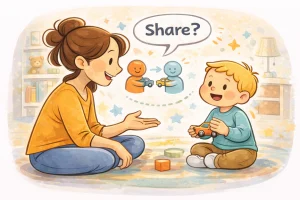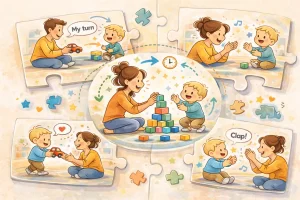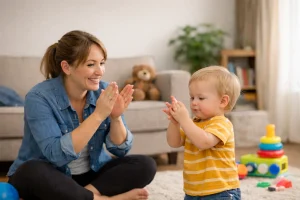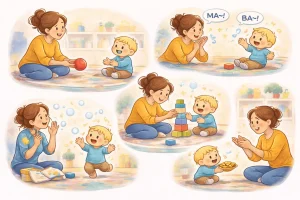Group Play Struggles and Speech Issues: Signs to Watch in Your Child
By Rajini D
Last Updated: September 3, 2025
Is your child happy to play alone but hesitant to join a group? Do they struggle to share toys, take turns, or start conversations with other kids? While some shyness is normal, ongoing group play struggles in toddlers can sometimes point to speech and language delays or even early social communication difficulties.
At this stage, play is more than just fun—it’s how children learn to connect, practice conversation, and build friendships. When a child avoids group play, stays silent in preschool, or shows limited pretend play, it may be a sign worth watching. Recognizing these early signs of speech and language delay can help parents take action sooner and support their child’s growth.
Free Speech Help for Kids
Concerned about speech delays? Book a free consultation with our expert speech therapist and get guidance tailored to your child’s needs.
Why Group Play Matters for Toddlers
Group play is more than children sitting together with toys—it’s the foundation of how little ones learn to communicate, share, and build social skills. For toddlers, joining playgroups or playing with peers is one of the first steps toward understanding the world outside of their family. When children interact with others, they begin to practice the basics of turn-taking, listening, and problem-solving, all of which are essential for healthy growth.
Also read: Pretend Play Ideas for Late Talkers: Build Speech Skills Naturally
Importance of Peer Interaction in Early Childhood
Peer interaction gives toddlers real-life chances to use their developing speech and language skills. Talking to other children, even in short phrases like “my turn” or “let’s play,” helps them practice vocabulary and learn how conversations work. Through play, they also learn to pick up on social cues—like recognizing when a friend is upset, or when it’s time to share a toy. These small moments build the foundation for strong communication and social confidence.
Role of Parallel Play, Associative Play, and Cooperative Play
Child development experts describe play in stages.
- Parallel play (around age 2): children play side by side but don’t directly interact.
- Associative play (around age 3): toddlers begin to share toys or comment on what the other is doing.
- Cooperative play (age 4 and up): kids work together toward a shared goal, like building blocks or playing “house.”
Each stage matters because it reflects growing social and language abilities. If a toddler remains stuck in parallel play well past the expected age, it can sometimes be a sign of communication delays or social challenges.
Also read: Pretend Play Ideas for Late Talkers: Build Speech Skills Naturally
Link Between Pretend Play and Language Development
Pretend play—such as playing “teacher,” “doctor,” or feeding a doll—goes hand-in-hand with language development. When children act out stories, they expand their vocabulary, practice sequencing (“first we cook, then we eat”), and learn to express feelings. Research shows that toddlers who engage in pretend play often have stronger speech and language skills later on. On the other hand, a lack of pretend play can sometimes indicate a speech delay or social communication disorder.
Encouraging even simple role-play games at home, like pretending to cook or going shopping, can help toddlers practice new words and conversation skills while boosting their imagination.
Common Group Play Struggles in Young Children
Not every toddler finds it easy to jump into play with others. While some children naturally run to join a group, others may feel left out, unsure, or struggle to keep up with the flow of play. These group play struggles in young children can be a normal part of development, but sometimes they also signal speech, language, or social communication challenges.
Trouble Joining Group Play or “Joining the Game”
Many toddlers want to play but don’t quite know how to join in. They may stand nearby, watching others, or hover on the edges of play without saying anything. This difficulty in joining group play often comes from limited speech skills or not knowing the right words to enter the game (“Can I play?” or “Me too”). Over time, repeated struggles in joining the game can make children feel left out, lowering their confidence with peers.
Struggles with Turn-Taking, Sharing, and Personal Space
Sharing toys, waiting for a turn, and respecting personal space are all big challenges for toddlers. These skills require both language (to express needs or negotiate) and social understanding. A child with a speech delay may grab a toy instead of asking, leading to frustration from peers. Similarly, not recognizing social cues like “wait” or “not now” can cause conflicts during group play. Supporting children through simple prompts (“say, my turn”) and modeling the behavior helps build both communication and cooperation.
Avoids Pretend Play or Symbolic Play
Pretend play—feeding a doll, playing doctor, or pretending to cook—is a milestone in both imagination and language development. If a child consistently avoids symbolic play, parents may wonder: “Does lack of pretend play mean autism?” While not every child who avoids pretend play has autism, limited or absent pretend play can be a red flag for speech and social communication delays. Pretend play helps children practice storytelling, sequencing, and emotional expression, so encouraging even small role-play games is an important step.
Prefers Playing Alone During Playdates
Some toddlers are content playing by themselves even when surrounded by peers. While playing alone is normal at times—especially during parallel play stages—persistent avoidance of peer play may point to underlying challenges. Parents often ask: “How to help a child who plays alone in playgroup?” The key is gentle encouragement, not force. Offering structured activities like building blocks together or simple turn-taking games can ease the transition into cooperative play, while also giving children the language tools they need to connect with peers.
Speech and Language Issues That Affect Play
When children struggle to communicate, it often shows up first during play. Play is where toddlers test out new words, practice conversations, and learn to connect with others. A communication delay in toddlers doesn’t just affect speech—it also impacts how they share ideas, make friends, and join group activities.
Communication Delay in Toddlers and Its Impact on Social Skills
Children with speech or language delays may want to play but lack the words to express themselves. Instead of saying “my turn” or “let’s build,” they might grab a toy or walk away when frustrated. This can make it harder to take part in group play and can even lead to fewer invitations from peers. Over time, missing these social opportunities can slow down both language growth and social confidence.
Difference Between a Late Talker vs Language Delay
Parents often wonder: Is my child just a “late talker,” or is it a true language delay?
- A late talker may speak fewer words at age 2 but is otherwise developing normally and usually catches up by preschool age.
- A language delay means a child has ongoing difficulties with vocabulary, sentence building, or understanding words—and without support, these challenges may continue.
Knowing the difference helps parents decide whether to “wait and see” or seek an evaluation from a speech-language pathologist (SLP).
Read more about Speech Delay vs Late Talker: Signs, Differences and Next Steps
Pragmatic Language Skills—Understanding Social Cues in Conversation
Even children with good vocabulary can struggle with pragmatic language skills—the ability to use language in social situations. For example, a child may talk a lot but miss cues like when to stop talking, how to stay on topic, or how to ask politely to join a game. Pragmatic language is what allows children to build friendships, understand jokes, and cooperate in play. When these skills are weak, group play can feel confusing and overwhelming.
How Receptive vs Expressive Language Delays Appear in Group Settings
Language development has two sides:
- Receptive language is how children understand what others say. A child with receptive delays may not follow group instructions like “put the blocks away” or “line up for a turn.”
- Expressive language is how children use words and sentences to communicate. A child with expressive delays may know what they want but can’t say it clearly, leading to frustration or withdrawal from play.
Both types of delays can create barriers in group play, where quick responses and back-and-forth communication are essential. Spotting these signs early can help families provide the right support and encourage positive peer interactions.
Know more: Top Strategies for Managing Receptive Language Disorder
Signs of Speech Delay or Social Communication Disorder
Every child develops at their own pace, but there are certain speech and social red flags parents should not ignore. Some children may have trouble using words, while others may speak but struggle to connect meaningfully during play. These differences can sometimes indicate a speech delay or a social communication disorder (SCD), both of which can affect how a child interacts with peers.
Limited Vocabulary, Echolalia, and Scripted Speech
One of the most common early signs of a speech delay is having a limited vocabulary for a child’s age. For example, a 3-year-old who uses fewer than 50 words may be behind expected milestones. Some children also show echolalia, where they repeat words or phrases they hear from adults, TV shows, or peers, rather than creating their own sentences. Others may rely on scripted speech—repeating memorized lines like “Do you want to build a snowman?”—which makes it harder to engage in spontaneous group play. While these behaviors may seem harmless, they can signal challenges in developing flexible, everyday language.
Avoiding Eye Contact and Not Responding to Name
Eye contact and responding to one’s name are key social communication skills. A child who consistently avoids eye contact or doesn’t respond when called may struggle to connect with others. During group play, this can look like a child who doesn’t notice when a peer offers a toy, or who doesn’t join in when invited to play. While occasional missed responses are normal, persistent difficulties may indicate a communication delay or even autism spectrum early signs.
Selective Mutism in Preschoolers
Some children talk freely at home but remain silent in preschool or during playdates. This condition, known as selective mutism in preschoolers, often stems from severe anxiety in social situations. While it is not the same as a language delay, it does affect how children use their language with peers. Selective mutism can lead to missed opportunities for group play, making early recognition and gentle support important.
When Group Play Struggles May Point to Autism Spectrum Early Signs
Not every child who struggles with group play has autism, but certain patterns may be early signs of autism spectrum disorder (ASD). These include avoiding pretend play, difficulty with turn-taking, lack of gestures like pointing or waving, and limited interest in peers. Combined with speech delays, these challenges may suggest that a child needs further evaluation. Early detection and early intervention services can make a significant difference in supporting a child’s communication and social development.
How Parents Can Support Group Play and Speech Development
Parents play a powerful role in shaping how children connect with others. When toddlers struggle with speech or group play, small, intentional strategies at home can make a big difference. By combining fun activities with gentle encouragement, you can help your child gain confidence in both their language and social skills.
Practical Playdate Ideas for Toddlers with Speech Delay
Playdates don’t have to be overwhelming—start small and structured. Invite just one familiar peer for a short time instead of a large group. Plan simple activities that don’t rely heavily on talking, such as building blocks, bubbles, or water play. These playdate ideas for toddlers with speech delay create natural chances to use short words and phrases like “my turn,” “your turn,” or “more, please.” Over time, these repeated interactions build both vocabulary and social comfort.
Activities to Build Joint Attention, Turn-Taking, and Sharing
Joint attention—the ability to focus on the same activity as someone else—is a key skill for language development. Parents can encourage it by pointing out objects, naming them, and waiting for the child to respond. Turn-taking games like rolling a ball back and forth or stacking blocks together teach patience and cooperation. Even simple sharing activities, such as passing crayons during coloring, help toddlers practice social skills they’ll need in preschool group play.
Encouraging Pretend Play to Boost Vocabulary
Pretend play is one of the best ways to expand a child’s vocabulary. Setting up a pretend kitchen, doctor’s office, or grocery store allows children to use words in context—“cut,” “cook,” “buy,” “check-up.” For children with speech delays, parents can model phrases (“The doll is eating,” “Let’s cook rice”) and then encourage the child to copy or add their own ideas. Encouraging pretend play not only boosts language but also strengthens imagination and emotional understanding.
Supporting Shy Children or Those Who Won’t Talk at Preschool
Some children are confident talkers at home but quiet in groups. Supporting a shy child or one who won’t talk at preschool takes patience. Instead of pressuring them to speak, give them low-stress ways to join in, like handing out toys, choosing the next game, or using gestures to participate. Praise even small efforts—like waving or making eye contact—because each step builds confidence. If silence in group settings continues, it may point to selective mutism or social anxiety, and seeking guidance from a speech-language pathologist (SLP) or counselor can provide tailored support.
When to Seek Professional Help
It’s normal for children to develop speech and play skills at slightly different rates, but certain red flags should not be overlooked. Knowing when to seek help can make a world of difference in your child’s confidence, learning, and friendships.
Red Flags for Speech and Language Problems at Age 2, 3, or 4
- At age 2: saying fewer than 20 words, not combining words (“want ball”), or not pointing to objects when named.
- At age 3: limited vocabulary, unclear speech most of the time, not asking simple questions, or avoiding play with peers.
- At age 4: difficulty forming sentences, struggles with basic grammar, not engaging in pretend play, or being hard for even family members to understand.
If your child shows these red flags for speech and language problems at age 2, 3, or 4, it’s worth discussing with a pediatrician or speech-language pathologist.
Difference Between Speech Delay and Social Anxiety / Selective Mutism
A speech delay means your child has trouble developing the ability to understand or use language for their age. In contrast, social anxiety or selective mutism happens when a child has the ability to speak but stays silent in certain settings, like preschool or playdates. While both can affect group play, the causes are different:
- Speech delay = skill is not fully developed.
- Selective mutism = skill exists but is not used due to anxiety.
Recognizing the difference helps parents provide the right type of support.
When to Consult a Speech-Language Pathologist (SLP)
If your child struggles to express themselves, avoids group play, or misses key milestones, it may be time to consult a speech-language pathologist (SLP). An SLP can evaluate whether your child’s difficulties are part of normal development or require therapy. They also provide targeted strategies to build vocabulary, improve social communication, and support success in preschool and beyond.
Benefits of Early Intervention for Speech Delay
The earlier a child receives support, the better the outcomes. Early intervention for speech delay gives children a head start in developing the skills they need for school and friendships. With therapy, toddlers often make rapid progress, reducing frustration and boosting self-esteem. Early support can also prevent small issues from becoming long-term challenges in reading, learning, and social skills.
Conclusion
Every child learns and grows at their own pace, but noticing early signs of speech and language delay can help parents take action quickly. If your toddler struggles with group play, turn-taking, or pretend play, don’t ignore these red flags. Talk to your pediatrician or a speech-language pathologist (SLP) for guidance. Remember, early intervention for speech delay can boost your child’s confidence, improve communication, and make social play easier. With the right support, your child can build stronger friendships and thrive in preschool and beyond. Trust your instincts—you know your child best.
Frequently Asked Questions:
1. Why does my toddler struggle with group play?
Some toddlers struggle with group play because they may not have the words to join in or may not understand the rules of turn-taking. Speech delays, shyness, or difficulty reading social cues often make it harder for them to “join the game.” Gentle support and practice can help them feel more confident.
2. Is not joining group play a sign of speech delay?
Yes, it can be. A child who avoids group play might be struggling to express themselves or follow simple instructions, which can point to a speech or language delay. If it happens often, it’s a good idea to check with a pediatrician or speech-language pathologist (SLP).
3. How do I know if my child is a late talker or has a language delay?
A late talker usually speaks fewer words early on but gradually catches up without extra help. A language delay means ongoing trouble with understanding or using words, and children often need therapy to progress. An SLP can help you understand which one applies to your child.
4. What are red flags for speech and language problems at age 2, 3, or 4?
- At age 2, fewer than 20 words or no two-word phrases may be a red flag.
- At age 3, unclear speech, very short sentences, or avoiding play with peers can signal a problem.
- At age 4, struggles with forming sentences, unclear speech, or lack of pretend play may point to a speech or language delay.
5. Does lack of pretend play mean autism?
Not always, but it can be an early sign of autism spectrum disorder (ASD). Pretend play is closely linked to imagination, social skills, and language development. If your child avoids pretend play consistently, it’s worth seeking an evaluation.
6. How can I help my child talk more during playdates?
Start with short playdates with one or two familiar children instead of large groups. Use structured activities like ball games, coloring, or building blocks where children can practice simple words like “roll,” “mine,” or “your turn.” Praise every attempt at communication to boost confidence.
7. What are pragmatic language skills in toddlers?
Pragmatic language skills are how children use language in real-life situations, such as greeting someone, asking politely, or staying on topic. These skills help children connect with peers during play. When pragmatic language is weak, a child may talk but still struggle to join group play.
8. Why does my preschooler talk at home but stay silent at school?
This may be selective mutism, a condition where children speak normally at home but remain silent in certain settings due to anxiety. It is not the same as a speech delay but can still affect group play and learning. Support from teachers, parents, and sometimes therapy can help.
9. When should I take my child to a speech-language pathologist (SLP)?
If your child shows red flags such as not talking by age 2, unclear speech at age 3, or limited sentences at age 4, it’s time to consult an SLP. You should also seek help if your child avoids group play, struggles with vocabulary, or doesn’t respond to instructions. Early assessment makes it easier to support progress.
10. How does early intervention help speech delay?
Early intervention for speech delay gives children targeted strategies to improve communication at a young age. With therapy, children can reduce frustration, increase vocabulary, and build the skills they need for group play and friendships. The earlier support begins, the stronger the long-term benefits.
About the Author:
Rajini Darugupally
M.Sc., Speech-Language Pathologist (9+ years of experience)
Rajini is a passionate and dedicated Speech-Language Pathologist with over 9+ years of experience, specializing in both developmental speech and language disorders in children and rehabilitation in adults. Driven by a desire to empower each individual to find their voice, Rajini brings a wealth of experience and a warm, genuine approach to therapy. Currently, at Wellness Hub, she thrives in a team environment that values innovation, compassion, and achieving results for their clients.
Book your Free Consultation Today
Parent/Caregiver Info:
Client’s Details:
* Error Message









